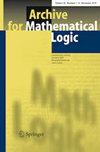走向同伦域理论
IF 0.3
4区 数学
Q1 Arts and Humanities
引用次数: 6
摘要
通过使用具有笛卡尔闭包和足够点的\(\infty \) -范畴,提出了构造具有\(\infty \) -群形结构的\(\lambda \) -模型的适当框架,我们称之为同伦\(\lambda \) -模型。由此,我们建立了一个推广领域论和\(\lambda \) -微积分的项目的开端,在这个意义上,\(\lambda \) -项相等的证明(路径)的概念被提升到更高的证明(同伦)。本文章由计算机程序翻译,如有差异,请以英文原文为准。

Towards a homotopy domain theory
An appropriate framework is put forward for the construction of \(\lambda \)-models with \(\infty \)-groupoid structure, which we call homotopic \(\lambda \)-models, through the use of an \(\infty \)-category with cartesian closure and enough points. With this, we establish the start of a project of generalization of Domain Theory and \(\lambda \)-calculus, in the sense that the concept of proof (path) of equality of \(\lambda \)-terms is raised to higher proof (homotopy).
求助全文
通过发布文献求助,成功后即可免费获取论文全文。
去求助
来源期刊

Archive for Mathematical Logic
MATHEMATICS-LOGIC
CiteScore
0.80
自引率
0.00%
发文量
45
审稿时长
6-12 weeks
期刊介绍:
The journal publishes research papers and occasionally surveys or expositions on mathematical logic. Contributions are also welcomed from other related areas, such as theoretical computer science or philosophy, as long as the methods of mathematical logic play a significant role. The journal therefore addresses logicians and mathematicians, computer scientists, and philosophers who are interested in the applications of mathematical logic in their own field, as well as its interactions with other areas of research.
 求助内容:
求助内容: 应助结果提醒方式:
应助结果提醒方式:


